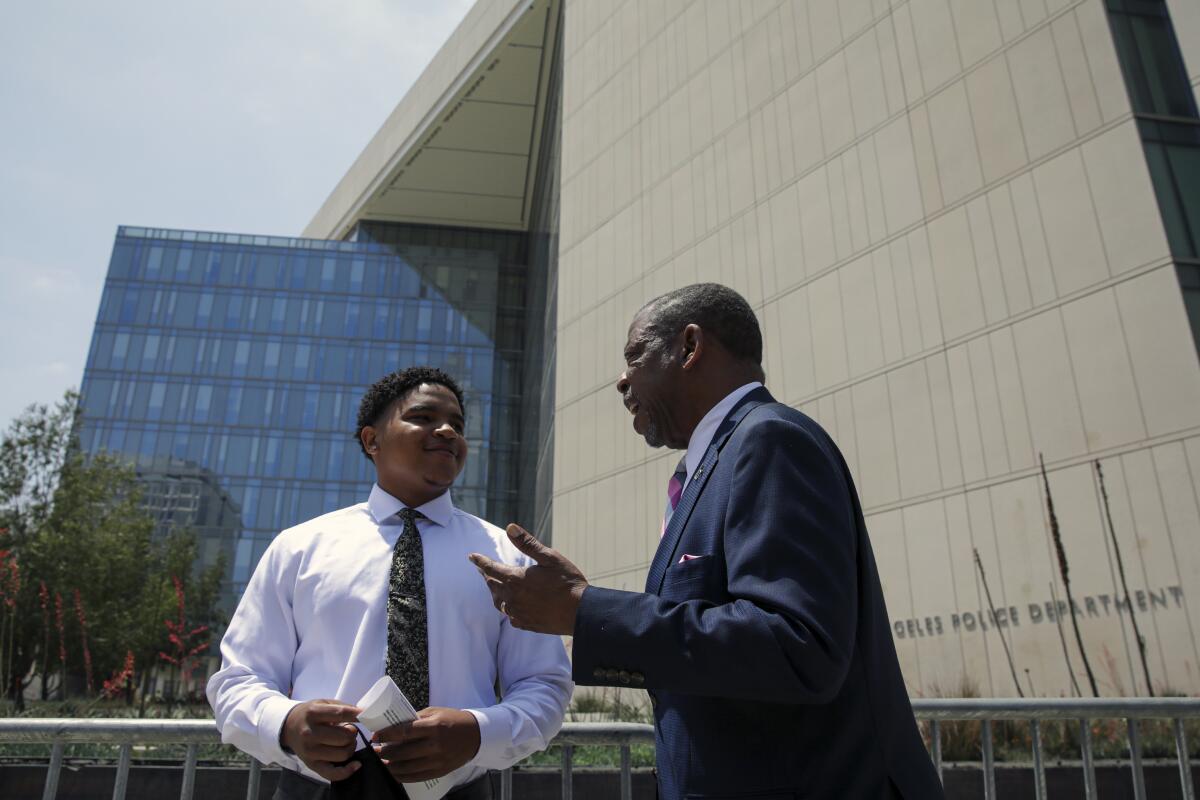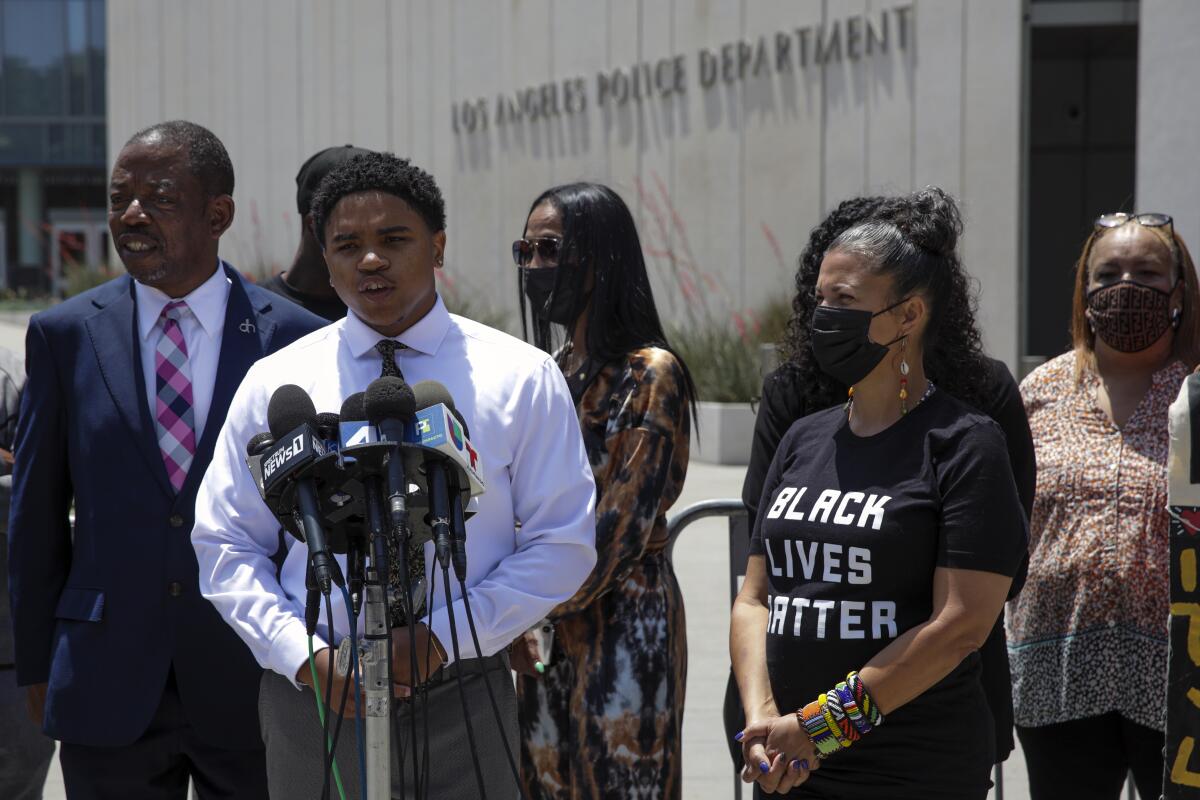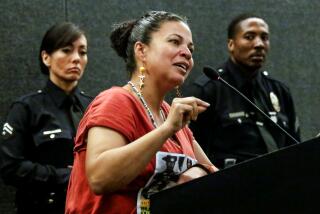He was injured during BLM protests last spring. Now he’s suing the LAPD and his uncle on the force

- Share via
Asim Jamal Shakir Jr. could barely hear the chants over the din of sirens and helicopters from his downtown Los Angeles apartment one evening last May, as Black Lives Matter protesters marched through the streets after the police killing of George Floyd.
Putting away his video games, the 23-year-old went outside to find a line of Los Angeles police officers armed with projectile weapons, pressing their way against a swarm of people. Within minutes, he said, police outnumbered protesters.
Shakir focused on the officers who looked like him, approaching every Black officer he saw and urging them to take off their uniforms and join his cause.
“The fact that George Floyd’s life was just taken, and all of these African American officers were standing next to their counterparts and inflicting more harm on the things we were protesting for, was just very disturbing,” Shakir said in an interview Tuesday.
As he made his way down the line, he noticed a familiar face behind the police helmet and visor. Then he saw the name: Anderson.
“Eric!” he exclaimed, recognizing his uncle.
In a video recording of his Instagram livestream from the night, Shakir can be heard trying to engage his uncle, repeating his name and yelling questions as the line of officers steadily continues to walk toward him.
“Our ancestors are turning over in their grave right now, Eric!” Shakir shouts, his voice growing hoarse. “Look at me in my eyes, Eric! … You know how your daddy feeling right now? That could have been you!”
Then a shot can be heard, and the phone falls. Reception falters. Restarting seconds later, the video shows a bloody hand as Shakir walks, then runs away from the scene.

In a lawsuit against Officer Eric Anderson and the Los Angeles Police Department filed Monday, Shakir alleged his uncle directed other officers to fire a hard-foam projectile at him. When Shakir bent over to pick up his fallen phone, he said, a second projectile hit him in the buttocks.
“There isn’t a paycheck in the world that should be worth your morals and values and family,” Shakir said Tuesday.
Shakir alleges that Anderson and other Los Angeles police officers violated his civil rights by using unreasonable force and not following proper training procedures. The incident required a series of medical, psychological and psychiatric treatments for Shakir, according to the lawsuit.
The LAPD denied a request for response or an interview with Anderson, saying the force does “not comment on pending lawsuits.”
Shakir’s legal action follows a wave of other lawsuits against the LAPD for its handling of the protests that started in spring of last year. Several of the lawsuits allege that officers inflicted serious injuries on protesters, including a burst testicle, knocked-out teeth and a lost eyeball.
A federal judge Monday extended restrictions on LAPD’s use of the projectile weapons, limiting which officers can use them and where they can be fired. The order forbids officers from targeting individuals with the weapons “unless absolutely necessary to prevent imminent serious bodily injury to the officer or others.”
Given Shakir’s familial relationship to the man he says is responsible for injuring him, lawyer Carl Douglas argues that Shakir’s case is monumental.
“Cops have always talked to other cops: ‘We’re not white, we’re not Black, we’re blue.’ I always thought that was balderdash,” Douglas said. “This case alarmed me and touched me like no other in my 42 years, because never have I ever heard of an officer knowing the subject of his abuse — let alone them drawing from the same bloodline.”

Shakir, the owner of Goin’ Postal Candy, a shipping and candy shop on Pico Boulevard, said he didn’t know his mother’s half brother too well, though Anderson occasionally stopped by family gatherings around the holidays.
“At the end of the day, even though we don’t spend time together — not that much time, we do have family functions every now and then — he knows that’s his family,” said Kelviana James, Shakir’s 34-year-old cousin, about Anderson.
Kristen Wright Matthews, 47, had just climbed into bed last May when she saw a notification that her godson, Shakir, had started a live video. A veteran of Los Angeles gang prevention and intervention efforts, Matthews watched his livestream in horror.
“My life literally flashed before my eyes, because I just could not imagine if that incident had gone any differently,” she said. “I almost died. I couldn’t sleep until I heard his voice.”
Matthews described Shakir as “a rose that grew out of concrete.” After his father and mother were incarcerated when he was a child, Shakir said he bounced between homes with his grandmother and aunt before landing in Atlanta, where he attended high school and became a football star.
He earned a scholarship to nearby LaGrange College, studying kinesiology and digital creative media and film. In addition to crafting a unique major and playing football, he started shooting music videos and gaining experience writing, directing and producing.
Just as he was finishing his degree, Shakir returned to Los Angeles in January 2019 to film “Land of No Pity,” a television pilot he created, drawing from his family’s experiences in L.A. The permit that Shakir obtained required a police presence, so he hired his LAPD uncle.
That was the last time Shakir recalled seeing Anderson until their encounter last May.
Times staff writer Kevin Rector contributed to this report.
More to Read
Sign up for Essential California
The most important California stories and recommendations in your inbox every morning.
You may occasionally receive promotional content from the Los Angeles Times.











